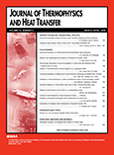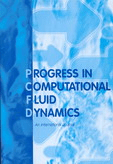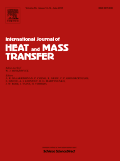
MICROGRAVITY SCIENCE AND TECHNOLOGY
Scope & Guideline
Unraveling the Mysteries of Microgravity
Introduction
Aims and Scopes
- Fluid Dynamics in Microgravity:
This area explores the behavior of fluids in microgravity, including thermocapillary convection, bubble dynamics, and phase change phenomena. The journal publishes studies that investigate how reduced gravity affects fluid movement and heat transfer. - Space Materials Science:
Research on the solidification and processing of materials in microgravity conditions is a core focus. This includes studies on crystallization, phase separation, and the mechanical properties of materials subjected to microgravity. - Space Biology and Medicine:
The journal emphasizes studies related to biological processes and health in space, including the effects of microgravity on cellular behavior, astronaut health, and countermeasures for maintaining human physiology during long-duration space missions. - Thermal Management Systems:
Research on thermal control systems for spacecraft and associated technologies is a significant area of focus. This includes studies on heat pipes, thermal coatings, and phase-change materials used in space applications. - Numerical and Experimental Techniques:
The journal frequently publishes both experimental and numerical studies that employ advanced modeling techniques to simulate microgravity phenomena, providing insights into the underlying physical processes.
Trending and Emerging
- Microfluidics and Lab-on-a-Chip Technologies:
There is a growing interest in microfluidic systems and lab-on-a-chip technologies, which leverage microgravity to enhance fluid manipulation and analysis at small scales, fostering innovations in life sciences and diagnostics. - Advanced Materials and Nanotechnology:
Research on advanced materials, particularly nanofluids and composite materials, is on the rise. Studies are increasingly exploring their unique properties and applications in microgravity, such as enhanced thermal conductivity and mechanical performance. - Biological and Medical Applications:
An increasing number of studies focus on the biological impacts of microgravity, including research on cellular responses, drug efficacy, and astronaut health. This trend reflects a broader interest in how microgravity affects living organisms. - Thermal and Energy Systems in Space:
Research is trending towards the development of innovative thermal management and energy systems for space applications, including new heat exchanger designs and phase-change materials that can operate efficiently in microgravity. - Interdisciplinary Research Approaches:
There is a noticeable trend towards interdisciplinary research that combines physics, biology, engineering, and materials science, reflecting a holistic approach to understanding complex phenomena in microgravity.
Declining or Waning
- Traditional Combustion Studies:
Research on combustion processes in microgravity has decreased, as interest shifts towards more complex interactions involving nanofluids and novel materials, rather than traditional combustion mechanisms. - Basic Fluid Mechanics:
Papers focusing solely on fundamental aspects of fluid mechanics in microgravity settings are becoming less common, as the field evolves to integrate more interdisciplinary approaches involving materials science and biological applications. - Low-Gravity Agricultural Research:
Although still relevant, studies specifically focusing on agricultural processes in low-gravity environments have declined as the focus shifts to broader biological responses and health-related studies in astronauts. - Static Experimental Setups:
There has been a decline in publications centered around static experimental setups in microgravity, with a growing emphasis on dynamic and interactive experimental designs that mimic real-world conditions in space.
Similar Journals

INTERNATIONAL JOURNAL OF HEAT AND FLUID FLOW
Contributing to Excellence in Mechanical Engineering ResearchFounded in 1979, the INTERNATIONAL JOURNAL OF HEAT AND FLUID FLOW is a premier publication in the fields of mechanical engineering, fluid dynamics, and heat transfer, published by Elsevier Science Inc. With an impressive impact factor and ranking in the Q1 category for Mechanical Engineering and Q2 for Condensed Matter Physics and Fluid Flow and Transfer Processes, this journal is highly regarded for its rigorous peer-reviewed articles that contribute significantly to the advancement of knowledge in these critical areas. Researchers, professionals, and students can access cutting-edge studies that explore the intricacies of thermal and fluid systems, ensuring they stay at the forefront of scientific exploration. The Scopus rankings further affirm its role as a leading source of impactful research, with significant placements in crucial academic categories. Join an active community of scholars committed to innovation and excellence in the exploration of heat and fluid flow phenomena.

JOURNAL OF ENHANCED HEAT TRANSFER
Empowering Researchers to Shape the Future of Thermal EfficiencyThe JOURNAL OF ENHANCED HEAT TRANSFER, published by BEGELL HOUSE INC, is a prominent resource for researchers and professionals in the fields of mechanical engineering, fluid flow and transfer processes, and condensed matter physics. With a history spanning from 1993 to 2024, this journal offers a platform for disseminating cutting-edge research and innovations that enhance our understanding of heat transfer phenomena. Although it operates under a traditional subscription model, its impressive standing is underscored by its Scopus rankings—positioned within the 59th percentile for Mechanical Engineering and 58th percentile for Fluid Flow and Transfer Processes. Additionally, it holds Q2 and Q3 categorizations in relevant fields, reflecting its importance in advancing knowledge and applications in heat transfer technology. This journal effectively bridges the gap between theoretical insights and practical solutions, making it an indispensable tool for academics, industrial practitioners, and students eager to explore advancements in thermal management and efficiency.

Polymer Crystallization
Advancing Knowledge in Polymer CrystallizationPolymer Crystallization, published by WILEY-HINDAWI, is a vital resource in the evolving fields of Materials Science, Mechanics of Materials, Physical and Theoretical Chemistry, and Polymers and Plastics. With an E-ISSN of 2573-7619 and a reputable standing reflected in its Q3 rankings across multiple categories in 2023, the journal serves as a platform for disseminating cutting-edge research and innovative methodologies related to polymer crystallization. Covering diverse aspects from the fundamental principles to applied technologies, this open access journal actively encourages contributions from researchers and practitioners worldwide, enhancing the collaborative spirit and knowledge exchange within the scientific community. The convergence of years from 2018 to 2024 illustrates the journal's commitment to staying current with advancements in the field, making it an essential reference for anyone engaged in polymer science.

JOURNAL OF THERMOPHYSICS AND HEAT TRANSFER
Catalyzing Insights into Fluid Flow and Heat TransferJOURNAL OF THERMOPHYSICS AND HEAT TRANSFER, published by the American Institute of Aeronautics and Astronautics, serves as a vital platform for the dissemination of cutting-edge research in the fields of thermophysics and heat transfer. With an ISSN of 0887-8722 and an E-ISSN of 1533-6808, this journal has been pivotal in enhancing our understanding of heat transfer mechanisms since its inception in 1987, continuing through 2024. It occupies a noteworthy position in various academic categories, boasting Q2 rankings in both Fluid Flow and Transfer Processes and Mechanical Engineering, reflecting its significant contribution to the engineering and physical sciences community. Although it currently does not offer Open Access options, the journal’s repository of rigorous peer-reviewed articles remains accessible to researchers, professionals, and students eager to expand their knowledge and apply innovative findings in aerospace, condensed matter physics, and planetary sciences. Emphasizing both theoretical and experimental approaches, the JOURNAL OF THERMOPHYSICS AND HEAT TRANSFER remains an indispensable resource for advancing the frontiers of engineering and applied sciences.

Archives of Thermodynamics
Innovating Insights into Thermodynamic ProcessesArchives of Thermodynamics is a reputable journal dedicated to the field of thermodynamics, published by the esteemed POLISH ACADEMY OF SCIENCES. With a robust history since its inception in 2003, this journal serves as a critical platform for disseminating high-quality research aimed at advancing knowledge and technology in thermodynamic systems and processes. Recognized for its contribution to the field, it holds a Q3 ranking in the Physics and Astronomy (miscellaneous) category as of 2023, with a respectable Scopus rank of #148 out of 243, placing it within the 39th percentile. Although it follows a traditional access model, the journal's commitment to scholarly excellence ensures that researchers, professionals, and students alike can benefit from its rich archives and ongoing discussions within the scientific community. Situated in Warsaw, Poland, the journal not only reflects a regional dedication to scientific progress, but also engages with global audiences interested in the evolving landscape of thermodynamic research.

PROGRESS IN COMPUTATIONAL FLUID DYNAMICS
Pioneering Insights into Computational Fluid DynamicsPROGRESS IN COMPUTATIONAL FLUID DYNAMICS, published by InderScience Enterprises Ltd, is a vital journal in the realms of Computer Science Applications and Condensed Matter Physics. Established in 2001, this journal serves as a platform for disseminating innovative research findings and technological advancements in computational fluid dynamics, targeting both theoretical and applied aspects. With a current impact factor positioning it in the Q4 quartile for its fields, it captures a wide array of topics including numerical methods, simulation techniques, and real-world fluid dynamics applications, fostering dialogue among researchers, practitioners, and educators alike. Although it does not provide Open Access options, it remains an important resource for those investigating fluid dynamics phenomena. As it continues to evolve through 2024, PROGRESS IN COMPUTATIONAL FLUID DYNAMICS is positioned to contribute significantly to the scientific community, addressing core challenges while promoting collaboration and knowledge exchange.

INTERNATIONAL JOURNAL OF HEAT AND MASS TRANSFER
Connecting Scholars to the Latest in Heat and Mass TransferINTERNATIONAL JOURNAL OF HEAT AND MASS TRANSFER is a premier, peer-reviewed academic journal published by PERGAMON-ELSEVIER SCIENCE LTD, focusing on the vital fields of condensed matter physics, fluid flow, and transfer processes, as well as mechanical engineering. With an impressive impact factor and consistently ranked in the Q1 quartile across multiple engineering and physics categories, this journal stands out for its rigorous scholarship and relevance to advancements in heat and mass transfer phenomena. Spanning from 1960 to 2024, it serves as a critical platform for researchers and professionals aiming to disseminate innovative findings and foster cutting-edge discussions in these interconnected domains. Though it operates on a subscription model, readers benefit from a comprehensive archive that covers seminal studies and contemporary advancements. Academics and practitioners alike can deepen their understanding of the complex interplay between heat and mass transfer, which is essential for numerous applications in engineering and scientific research.

Thermophysics and Aeromechanics
Advancing the Frontiers of Aerospace InnovationThermophysics and Aeromechanics, published by PLEIADES PUBLISHING INC, is an esteemed journal dedicated to advancing the fields of aerospace engineering, energy engineering, modeling and simulation, as well as nuclear and high energy physics. With an ISSN of 0869-8643 and E-ISSN 1531-8699, this journal serves as a vital platform for researchers and professionals working at the intersection of thermophysics and aeromechanics, delivering cutting-edge research, reviews, and case studies. Despite its current position in Quartile Q4 across multiple categories, including aerospace and energy engineering, it provides a unique opportunity for emerging ideas in these domains to gain visibility and impact. The journal's convergence of diverse scientific disciplines is critical for fostering innovation and technological advancements, making it an essential resource for students, practitioners, and academics alike. In this era of rapid scientific development, Thermophysics and Aeromechanics plays a pivotal role in disseminating knowledge and facilitating interdisciplinary collaboration among a global audience.

METALLURGICAL AND MATERIALS TRANSACTIONS B-PROCESS METALLURGY AND MATERIALS PROCESSING SCIENCE
Elevating Knowledge in Process Metallurgy and Materials ScienceMETALLURGICAL AND MATERIALS TRANSACTIONS B-PROCESS METALLURGY AND MATERIALS PROCESSING SCIENCE, published by Springer, serves as a pivotal platform in advancing the field of materials science, focusing specifically on the intricacies of process metallurgy and materials processing. With an ISSN of 1073-5615 and an E-ISSN of 1543-1916, this esteemed journal boasts an impressive standing with its 2023 category quartiles, ranking Q2 in Condensed Matter Physics, Materials Chemistry, and Mechanics of Materials, while achieving a top-tier Q1 classification in Metals and Alloys. Positioned in the United States, the journal has been publishing leading research since its inception, with converged years spanning from 1973 to 1979 and 1995 to 2024. The journal's robust impact within its fields is reflected in its Scopus rankings, notably ranking #42 out of 176 in Materials Science with a 76th percentile. Though not an open access journal, its comprehensive and high-quality research articles cater to the needs of researchers, professionals, and students, ensuring they remain at the forefront of advancements in metallurgy and materials processing science.

Computational Thermal Sciences
Pioneering Research in Energy Engineering and Fluid DynamicsComputational Thermal Sciences, an esteemed journal published by BEGELL HOUSE INC, presents cutting-edge research at the intersection of computational mathematics, energy engineering, and fluid dynamics. With an ISSN of 1940-2503 and an E-ISSN of 1940-2554, this journal aims to disseminate high-quality research articles, reviews, and methodologies that improve our understanding of thermal processes and their applications. Renowned for its solid impact in the field, it holds a Q3 ranking in multiple categories including Computational Mathematics and Energy Engineering for 2023. As the field evolves, the journal continues to play a pivotal role in bridging theoretical research with practical innovations, thereby catering to a diverse audience of researchers, professionals, and students. Although it operates on a subscription model, the journal ensures accessibility to significant contributions in thermal sciences from 2009 to 2024, fostering an environment of knowledge sharing and collaboration.